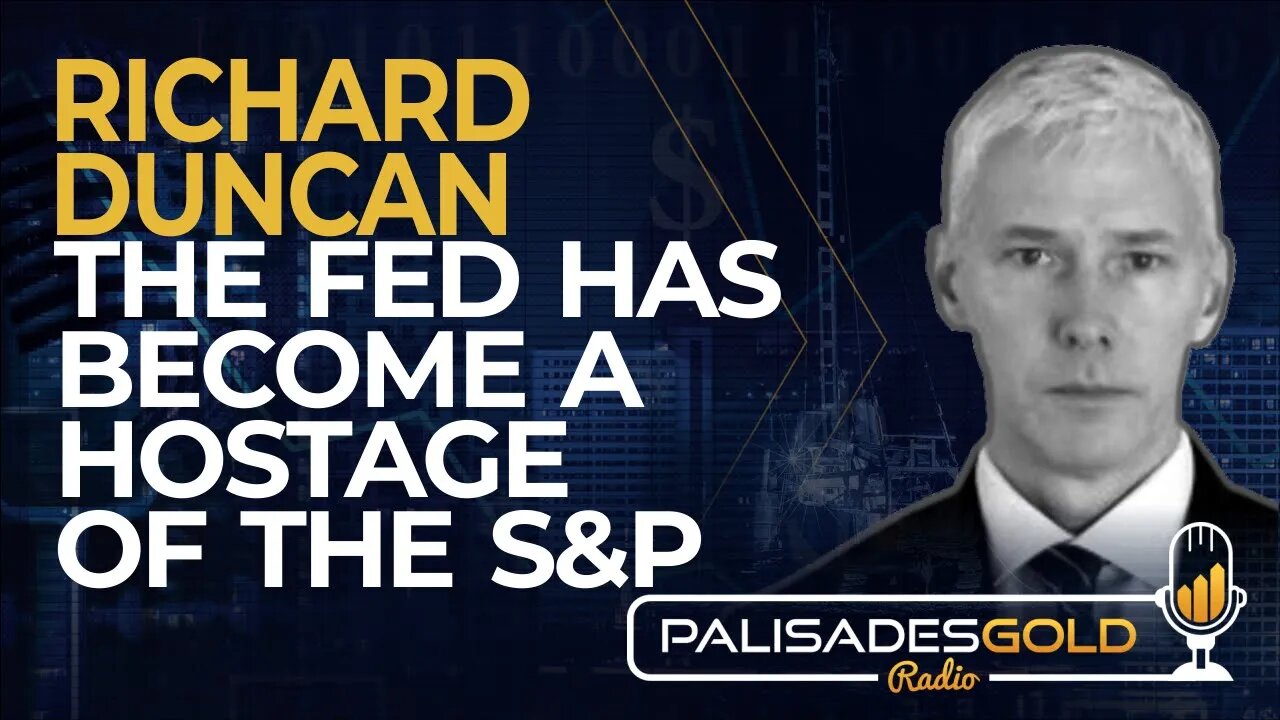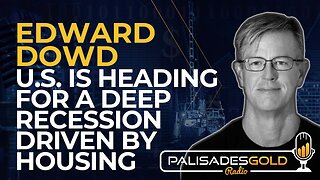Premium Only Content

Richard Duncan: The Fed has Become a Hostage of the S&P
Tom welcomes a new guest Richard Duncan to the show. Richard is a macroeconomist and the author of three books on the global economic crisis.
To subscribe to our newsletter and get notified of new shows, please visit http://palisadesradio.ca
Richard discusses how (total credit debt) credit growth now drives the economy. Currently, U.S. debts have surpassed 85 trillion. Whenever credit growth slows below two percent annually the U.S. enters a recession. This has happened nine times since 1950.
The economy has changed fundamentally since the 19th century. Gold has not been money for fifty years. The big change came in 1968 when the Fed was allowed to create money without having a reserve. When the gold window closed in 1971 so ended the corrective mechanism to balance the trade imbalances between countries.
In the 80s the U.S. discovered they could run trade deficits without much consequence. This did result in the dollar being devalued but during the 90s we saw the economies of developing countries improve massively. The U.S. was able to rely on cheap foreign labor and manufacturing to produce low-cost goods. Until recently money printing had little impact on inflation growth.
Month on month change for inflation is breaking out higher. There are many reasons for higher prices over the past couple of years and inflation is not certain. For now, large stimulus packages are not expected. Without stimulus, we would likely have had a major recession. Chairman Powell has recently stated plans to accelerate tapering and raise interest rates. Credit growth is expected to slow rapidly and without more debt, the economy could contract. Our system is no longer that of capitalism but 'creditism'.
The Fed is hostage to the S&P and is covering for any market corrections. The economy is essentially on life support. The Fed can't raise interest rates far and it seems less likely to do so in light of the new covid variant.
Wealth is becoming very stretched compared to income. Income is not keeping up and overall downward pressure remains on wages. People need income to pay their interest on the money they borrow. Income is no longer keeping up with assets like home prices.
Richard believes the Fed can keep this game going for a long time perhaps decades. He believes there is a risk of softer gold prices in the future.
Time Stamp References:
0:00 - Introduction
0:42 - Credit & Growth
2:34 - Economic Standards
13:01 - Inflation & Stimulus
17:41 - Recession & Credit-ism
19:27 - Credit Sector Borrowing
25:16 - Lending Standards
29:02 - Role of Interest Rates
30:10 - Wealth to Income Ratio
37:43 - Endgame?
44:12 - Dollar Outlook & Q.E.
45:11 - Softer Gold Price?
46:30 - Best Assets to Own?
48:08 - Book Recommendations
51:33 - His Newsletter Offer
Talking Points From This Week's Episode
- How credit now drives our current 'creditism' economic system.
- The consequences of a credit system and why trade imbalances no longer matter.
- Inflation and recession risks due to insufficient borrowing next year.
Guest Links:
Website: http://www.richardduncaneconomics.com/
Twitter: https://twitter.com/PaperMoneyEcon
Newsletter Offer:
https://richardduncaneconomics.com/product/macro-watch/
For a 50% discount, when prompted, use the coupon code: Value
Richard Duncan is the author of three books on the global economic crisis, including the international bestseller, The Dollar Crisis: Causes, Consequences, Cures, which forecast the global economic crisis of 2008 with extraordinary accuracy.
Since beginning his career as an equities analyst in Hong Kong in 1986, Richard has served as global head of investment strategy at ABN AMRO Asset Management in London, worked as a financial sector specialist for the World Bank in Washington D.C., and headed equity research departments for James Capel Securities and Salomon Brothers in Bangkok. He also worked as a consultant for the IMF in Thailand during the Asia Crisis.
He is now the publisher of the video-newsletter Macro Watch which can be found on his website.
#RichardDuncan #Credit #Debt #Dollar #Deficits #CreditCycle #Fed #Economy #Recession #Inflation #Equities #InterestRates #Omnicron #Incomes #Wages #Gold #Macro #Stimulus
-
 51:18
51:18
Palisades Gold Radio
26 days agoEdward Dowd: U.S. is Heading For a Deep Recession Driven by Housing
7892 -
 LIVE
LIVE
LethalPnda
2 hours agoLocked & Loaded! 🔥 Fate Trigger Beta #RazerCreator #SpacePanda @Mystivis
81 watching -
 LIVE
LIVE
BigDaddySlick78's Live Gaming Channel
2 hours ago💰I Pay You To Play Call of Duty Warzone Rebirth Island LIVE #callofduty #warzone #cod #gaming
28 watching -
 1:59:43
1:59:43
Side Scrollers Podcast
2 days agoRIP Hulk Hogan + Payment Processor CENSORSHIP Has Officially Begun + More | Side Scrollers
174K13 -
 LIVE
LIVE
Lofi Girl
2 years agoSynthwave Radio 🌌 - beats to chill/game to
302 watching -
 1:56:31
1:56:31
The Pascal Show
19 hours ago $6.35 earnedGHISLAINE FLIPS?! DOJ Receives SECRET LIST of 100 Epstein Associates!”
17.4K7 -
 10:17
10:17
Dr Disrespect
11 days agoIt's Time To Get Serious
186K31 -
 2:15:09
2:15:09
Badlands Media
1 day agoDevolution Power Hour Ep. 375: Obama’s Orders, Ukraine’s Collapse & the Inversion of Justice
309K121 -
 2:32:03
2:32:03
BlackDiamondGunsandGear
15 hours agoAFTER HOURS ARMORY w/ DLD & John from GOA & FLR
35.6K7 -
 1:05:28
1:05:28
Man in America
16 hours agoTREASON? Obama, Hillary, and Soros in the New World Order Agenda EXPOSED w/ Mel K
103K91